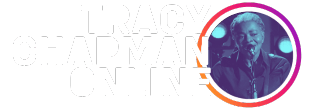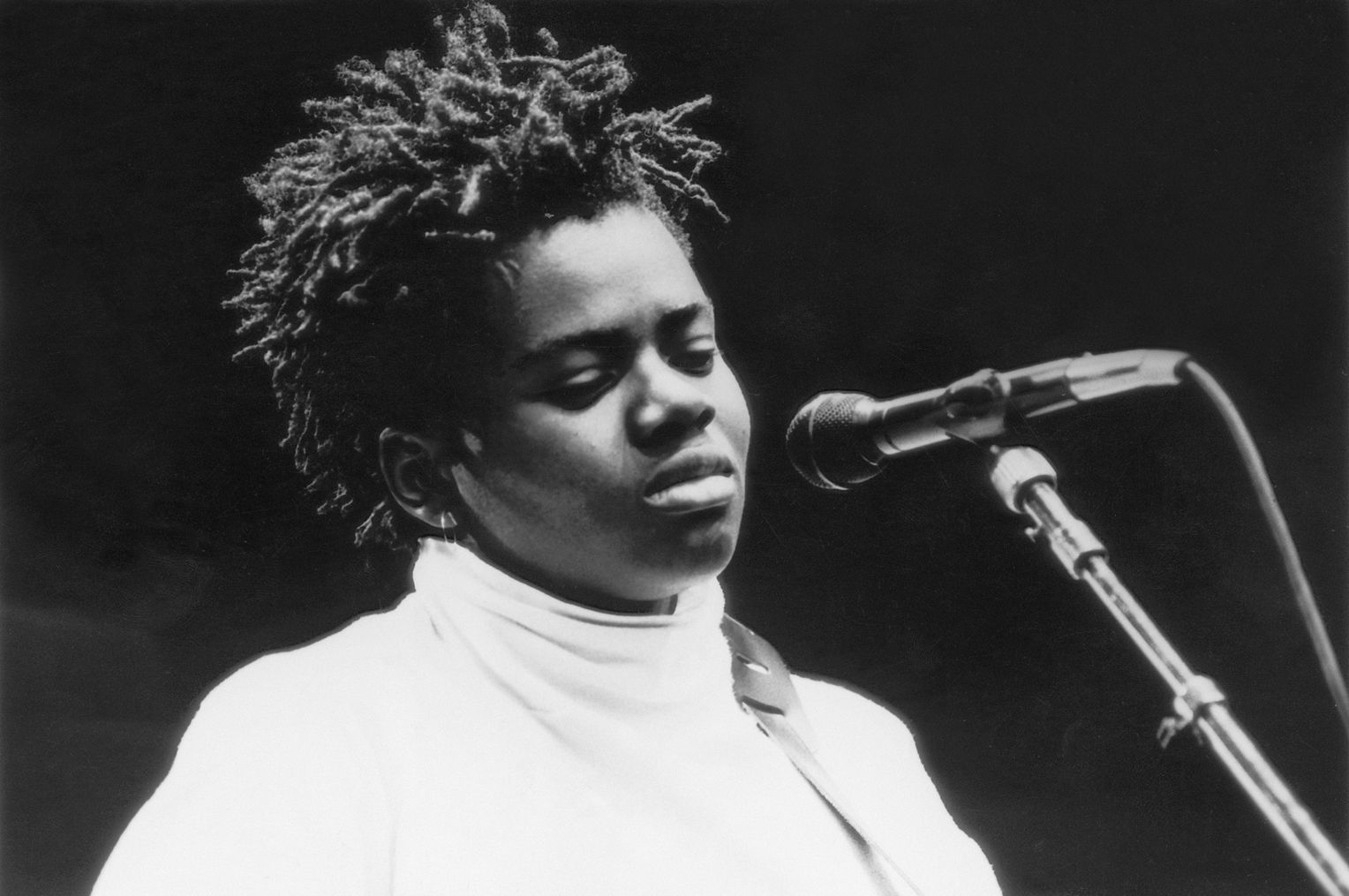By Sergey Chernov, St Petersburg Times, Friday, June 16, 2006
Tracy Chapman, ahead of her St. Petersburg concert on June 23, explains why she doesn’t like to be thought of solely as a folk singer in the mold of Joan Baez or Bob Dylan.
Singer/songwriter Tracy Chapman discusses her musical influences. U.S. singer/songwriter Tracy Chapman, who will make her live debut in Russia this week, may be seen as a folk performer, but her celebrated songs such as “Talkin’ ‘Bout a Revolution” have nothing to do with “Blowin’ in the Wind” and the 1960s folk movement and are influenced more by great soul and R&B singers, she said in an interview with The St. Petersburg Times.
“I grew up in the ’70s in a working-class African-American neighborhood and no-one in that neighborhood ever listened to white folk music, no-one was listening to Joan Baez or Bob Dylan or any of those people, so they weren’t influences,” said San Francisco-based Chapman by telephone from a New York hotel last week.
“I think whenever a person plays an acoustic guitar, for the most part people tend to think about the folk-music tradition, but I think often they are considering the Woodstock era, you know, ’60s and ’70s singers/songwriters, but they are not thinking about the full American music tradition. You know, the blues is folk music, gospel can be considered folk music in some regards. Country music, of course, is folk music…
“So it’s a category that has broadened to include all those different types of music… but I think it’s mainly a label that’s given by people because of instrumentation, you know, and the fact that acoustic guitar is so much associated with what is considered white American folk music.
“I’d say if I was influenced by anything, it was some of the country music that my mother liked to listen to. You know, she listened to Charlie Pride, Dolly Parton, people like that. I remember seeing Glen Campbell play acoustic guitar, and Buck Owens, and it maybe that I was interested in playing guitar because of that. But I grew up listening to R&B and soul music, and gospel music and jazz, but not folk music.
Chapman’s forthcoming St. Petersburg concert is part of the European leg of an extended tour in support of her seventh studio album, “Where You Live,” and her only concert in Russia.
Released in September, the album, which spawned the singles “Change” and “America,” was recorded in Chapman’s rehearsal-space-turned-studio with guitarist Joe Gore and drummer Quinn, both of whom are backing her on the current tour. With Red Hot Chili Peppers’ Flea guesting on three tracks, the album was co-produced by Chapman and celebrated sound engineer Tchad Blake, known for his work with Peter Gabriel, Pearl Jam, Tom Waits and Elvis Costello.
Chapman said that the album’s style was determined by the songs she had written.
“Generally, I’m approaching the records in the same way, and that’s that I want the songs to dictate the tone of the record and the style of the production and the type of arrangement,” said Chapman.
“It’s really about what the songs required. That’s what determines the overall feeling and sound of the record.
“In this case I wanted to record as a trio, and so I worked with Joe and Quinn for a few years before making the record, and played lots of concerts with them, just three of us, and decided that I want to make a record in that way, and then that we would also make it in the way that people made records in the early days of recording by playing in one room together.”
Born in Cleveland, Ohio in March 1964, Chapman started to sing as a child at family gatherings.
“Music has always been a part of my life. I started singing, I think, as soon as I could talk,” she said.
“I don’t know if it’s like this in Russia, but, you know, there are some families where everyone seems to sing and whenever there’s a family gathering that everybody sings together, and so was the case with my family, so I started singing very early on, and I was interested in playing a musical instrument. My first instrument was ukulele, and then I played an organ for a bit and when I was seven or eight-years-old, I asked my mother to buy me an acoustic guitar, so I started playing guitar and writing songs at a very young age and continued to do that over the years.
Chapman combined songwriting and performing in the street and in coffee houses with studying at Tufts University in Medford, Massachusetts, and graduated with a degree in anthropology, with a special interest in West African studies.
“I went to college with the idea of becoming a veterinarian; I was planning to major in biology. And ultimately majored and graduated with a degree in anthropology. But during the time that I was in school, I played for my friends and I started performing publicly, performing the songs that I’ve written over the years.”
Chapman became famous overnight after a performance at the televised Nelson Mandela 70th Birthday Tribute concert in June 1988, watched by 72.000 people at London’s Wembley Stadium and more than 600 million television viewers from 60 countries, including the Soviet Union.
“I was honored to be there and to have added my voice to all the other voices that were asking for Nelson Mandela’s release, and the people who considered the plight of black Southern Africans and the fact that they were unable to represent themselves and take full part in their society,” she said.
“So I was really honored to be a part of that. I was terrified to be on stage that day. It was the first time I ever played for an audience of that size, it was pretty overwhelming. But it was an amazing experience and obviously one that is hard to forget.”
Chapman’s 1988 eponymously titled debut album, which yielded such songs as “Fast Car,” “Talkin’ ‘Bout a Revolution” and “Baby Can I Hold You,” went multi-platinum and won four Grammies. She took part in an Amnesty International Human Rights Now! Tour later that year.
“The Amnesty tour was a tour to raise awareness about human rights and, specifically to give people information about the Declaration of Human Rights, the document signed by many countries around the world, but that was not really fully realized, and I generally think that many of the issues people see around the world these days are related to human rights.
“You know, healthcare is a human rights issue, quality education is a human rights issue, you know, being secure and having the right to self-determination are also human right issues. Having the right to vote is a human rights issue. Those are all things that I continue to be concerned with, and so I continue to address through my music by working with organizations that are working on these issues.”
Despite her social and political commitments, Chapman opposes being seen as a political performer.
“I don’t see myself as a political songwriter or protest singer, but I do write about social issues and ideas that I think touch on politics,” she said.
Lyrically, she was influenced by poetry and soul and R&B singers, she said.
“As a child, I was always interested in poetry and I read a lot of poetry and wrote poetry before I started writing songs, so my interest in the word comes from that, from being an avid reader,” she said. “And as someone who loves good story-telling and who appreciates the poetic use of language.
“[My songwriting] didn’t necessarily come from music, but I’d also say that a lot of people don’t realize that many of the songs, the R&B and soul songs from the ’70s were songs dealt with social issues and politics. You know, songs like Stevie Wonder’s ‘Front Line,’ songs like Marvin Gaye’s ‘What’s Going On,’ and songs by people like Curtis Mayfield and James Brown.”
“So in listening to music, in listening to soul music and R&B music I paid attention to those lyrics and may even in some ways have been inspired by them. So I would say that people should be reminded that that kind of appreciation can be stirred by other music besides from folk music and the music written by singers/songwriters.”


